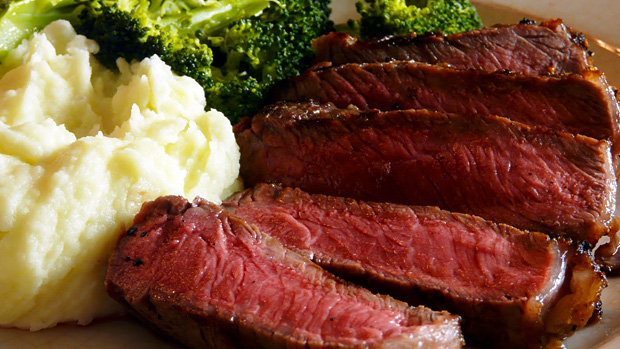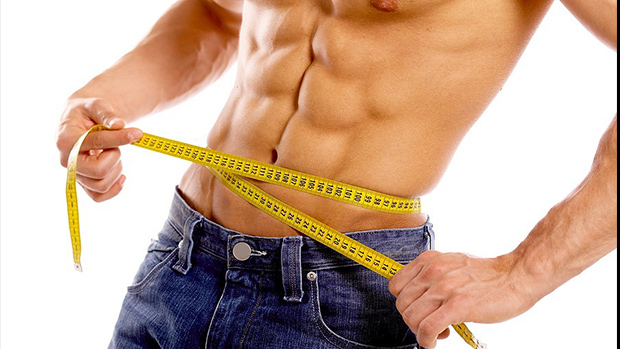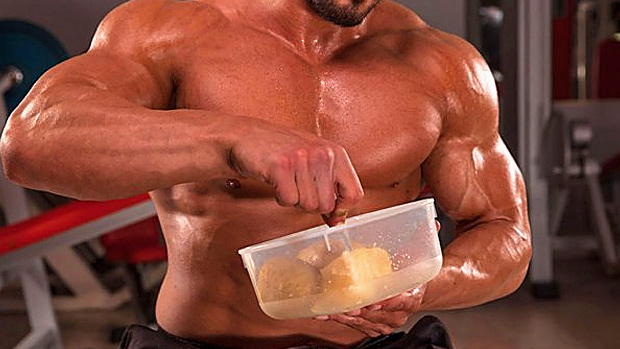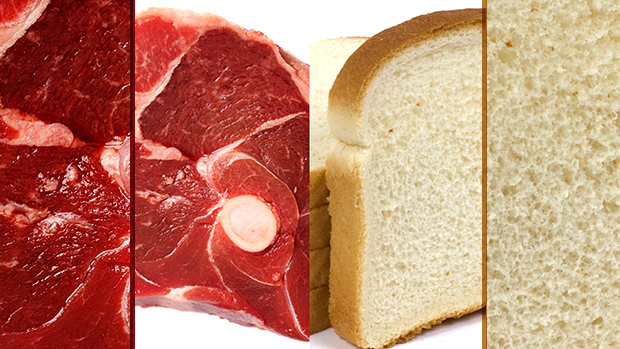"Bodybuilding is at least 80% nutrition" - Vince Gironda
"Nutrition is 100%, training is 100%, recovery is 100%" - Dorian Yates
"If you're not growing, it's likely your diet, not your training, that's holding you back" - Dr. John Berardi
I remember when I was getting into serious Olympic lifting training: after every good workout I would reward myself with five burgers from a local fast food joint. And this wasn't only an occasional thing, either. I ate like this pretty much all the time. Not surprisingly, despite being pretty strong, I basically looked like a pile of fecal matter, or the Michelin man's (fatter) brother!
I trained hard, sometimes twice a day. I took every supplement known to man, yet I stilljust looked like a fat guy who lifted weights. Which is, of course, exactly what I was. Why, oh why was I not a lean, muscular Adonis? Was it a genetic curse? Nope, just old-fashioned lousy dietary habits.
One of my former clients, a 6'1" 165-pound hockey player, had the opposite problem: he would train like a madman (I made sure of that), and actually made some decent strength gains (he once surprised the NY Rangers strength coach at rookie camp by easily power cleaning 275 pounds), but he could not make an ounce of muscle stick to his bones. I suspected insufficient eating. He told me that he was eating a lot, so I had him keep a food diary of everything he ate for a week.
His eating patterns were exactly as I suspected: he was eating like a bird all day, followed by one big meal in the evening. The big meal made him feel so full that he really believed he was eating a lot, but his average daily caloric intake was only around 1700 calories per day. This was a young guy with a lightning-fast metabolism, who was training twice a day (one weight session, one track session) four times a week. 1700 calories was barely enough to keep him alive, let alone allow him to gain size! I changed his diet, and he went from 165 to 190 pounds in less than a year.
If you're going to eat like a bird, eat like this bird.

The moral of these stories is that if you're training hard and not gaining muscle, then your nutrition plan (assuming you even have a plan) is not adequate.
If you have the opposite problem of training hard and not being able to lose fat, then the reason is probably the same: your diet sucks!
No matter what, if your nutritional approach isn't optimal for your objective, you won't get the results you want.
With that in mind, this article will show you the basics of proper nutrition for body composition (gaining muscle and/or losing fat). Of course, knowing the basics isn't nearly enough. Sticking to a muscle-friendly diet is hard, hard work. In some ways it's even harder than training: you can usually motivate yourself to train hard for an hour or so, a few times a week. Diet is different. You have to stay committed and disciplined 24 hours a day, seven days a week.
Controlling your cravings and urges can be painful. Believe me, I know. It sucks. After a hard day, when you're tired and stressed out, that half-gallon tub of chocolate ice cream starts to look mighty friendly. Proper nutrition has its rewards, but the psychological price is high.
That said, if you're really willing to take the extra step toward achieving your physique goals, then by all means, read on.
What Are We Talking About?
Understanding how to plan an adequate body composition or muscle-building diet requires a basic understanding of a few basic concepts. My objective here is not to give you a thorough course on each individual component of a proper nutrition program. Rather, I hope to give you enough information so that you will be able to read a nutrition article or plan a nutrition program without feeling like you're lost in a foreign country.
Protein
Each gram of protein provides four calories. The word "protein" comes from a Greek word meaning "first" or "of primary importance." For bodybuilders and strength athletes, this nutrient is of primary importance, because proteins are the building blocks of, among other things, muscle tissue. Protein is broken down into amino acids in the body, and these amino acids are turned into muscle via a process called protein synthesis, or muscular anabolism (from another Greek word meaning "to build up" or "ascend."
Proteins (amino acids) make up the major portion of the solid part of a muscle. Around 20-25% of the muscle content is protein, 70% is water and other fluids, and the remaining 5-10% comprise muscle glycogen, minerals, intramuscular fatty acids and other elements. You don't need to memorize the proportions, just master the point that protein is the most important nutrient for muscular growth. No protein, no muscle.
Exactly how much protein is needed for maximum growth? Good question. Studies have shown over and over that a higher protein intake is associated with a more positive nitrogen balance and a higher rate of protein synthesis. In other words, the more protein you eat, the more muscle you build.
However, it's not that simple. At some point we run smack into the law of diminishing returns. Once you've reached the maximal amount of protein that your body can use to build muscle, any additional protein you swallow will notincrease your rate of muscular growth.
That sucks, doesn't it? I mean, wouldn't it be great if all we had to do to build muscle was consume tons of protein? In no time at all, we'd all be 250-pound shredded behemoths! Even the girls! Sadly, we are limited by our own natural biochemistry when it comes to being able to use protein (amino acids) to build muscle.
Protein synthesis (using protein to build muscle tissue) is highly dependent on our hormones. Hormones are chemical messengers that run through our body, responsible for making the body "do things." One of these "things" is synthesizing protein. The hormones mainly responsible for stimulating this progress are testosterone (the male hormone), growth hormone (GH), insulin-like growth factor-1 (IGF-1), insulin, and cortisol.
Testosterone directly increases protein synthesis, and thus allows you to make good use of the protein you just ate. The more testosterone you have in your body, the more protein you can turn into muscle. This is why some bodybuilders and other athletes use injectable testosterone or synthetic hormones (steroids): by artificially jacking up their hormonal level, they increase their body's capacity to use protein for building muscle.
Some people have naturally higher T levels than others, which will allow them to build muscle faster than others, especially if they consume more protein. But the fact remains: if you're not using anabolic or androgenic steroids (and as a newbie, you'd better not be) then your body has a limited capacity to use protein for muscle-building, and testosterone is the major limiting factor.
What about GH, you ask? One would certainly imagine that a substance called "human growth hormone" would make humans grow. Well, it does, if you're a child, but GH is only mildly anabolic in adults, meaning that it only increases your capacity to build muscle by a small amount. However, its sub-hormone IGF-1 is highly anabolic. IGF and GH are produced in bursts (IGF production following a burst of GH production). As with other hormones, the amount produced varies from person to person, and this can also become a limiting factor when it comes to building muscle.
Insulin is often said to be the most anabolic (muscle-building) hormone. This is because its main function is to tell the body's "storage units" to open up, pull in "stuff" and store it. The main storage units are the muscles, liver, and fat cells, and the "stuff" to be stored are the nutrients we eat (protein, carbs, fat, etc.). Insulin opens up those storage units, but each of them have their own degree of responsiveness to this hormone. The more sensitive a unit is, the easier it will open up and store nutrients.
In an ideal world our muscle cells would be super sensitive, and our fat cells only slightly sensitive. This would surely facilitate muscle gain and minimize fat gain. Basically, the more sensitive your muscle cells are, the greater your muscle-building potential will be. The more sensitive your fats cells are, the greater your blubber-building potential will be!
We'll come back to this concept later on, but for now just master the point that the more sensitive to insulin your muscle cells are, the more amino acids you can store in them, and therefore the more you can use to build new muscle tissue.
Finally, cortisol is a hormone that inhibits muscle-building. Not only that, it can actually decrease muscle mass. It's what's called a catabolic hormone. Its role is to mobilize nutrients (get them out of their storage units) so that the body can make fuel from them. This also includes muscle: cortisol can break down muscle tissue into amino acids, which in turn can be transformed into sugar (glucose) by the liver to be readily used for energy. This is what we call catabolism (sounds like "cannibalism"). It's the opposite of anabolism, and for a bodybuilder, it's generally a Bad Thing. So it would seem that cortisol is a bad hormone.
Well, yes and no. Actually, cortisol is necessary during a workout, because it helps with energy production, as well as with the capacity to cope with physical stress. However, if cortisol levels are chronically elevated after a workout, the body stays in a catabolic (breakdown) mode instead of being in an anabolic (building) mode. This often happens in individuals who are stressed out: cortisol is a stress hormone: it's released when stress levels go up. Individuals who are under a lot of stress will thus have a harder time using a lot of protein to build muscle, since their body is in a constant state of breakdown, not building.
As you can see, simply feeding yourself tons and tons of protein will not necessarily mean gaining more muscle. Overfeeding protein can also have another downside: if protein is the dominant nutrient in your diet, you run the risk of your body adapting to the use of protein as its main energy source. If that happens, your body will burn more protein for energy, and will thus have less of it available for muscle-building purposes. The trick is to increase your protein intake until you reach the maximum amount for optimum muscular growth.
So how much is that, exactly? As you probably understand by now, this is an individual thing. However, most natural (non-steroid using) trainees will benefit from a protein intake between 1.25 and 1.5 grams per pound of body weight. More than that will probably not lead to any additional gains.

Protein is found primarily in animal products such meat, poultry, fish, shellfish, eggs, milk and cheese. And to insure you get enough quality protein, check into Metabolic Drive®.
Carbohydrates (carbs)
Carbs are the first of the two "energy" nutrients. Each gram of carbs provide 4 calories. The main function of carbs in the body is to provide a quick source of fuel for physical and mental work. It can be stored in any of the three main storage units of the body: in the muscle and liver as glycogen but also as body fat.
Carbs are the body's preferred energy source under most circumstances, so if sufficient amounts of carbs are present in the diet, it's hard to "force" the body to use fat for fuel. In other words, if you eat a lot of carbs, your blubber will likely stay right where it is.
Carbs also cause the greatest insulin spike of all three main macronutrients (protein, carbs, fat). In fact, the elevation of blood sugar levels (carbs are sugar) is the main stimulus for insulin release. This is both a pro and a con: insulin, you recall, can help drive protein and carbs into the muscle (a Good Thing) but it can also stimulate fat storage (a Bad Thing). Furthermore, as long as insulin levels are elevated, it's next to impossible under normal circumstances to stimulate the release of fatty acids from the fat stores. This means that as long as insulin levels are high, fat loss is almost impossible. Remember also that when insulin levels are elevated it puts your body into "storage" mode.
So under certain circumstances elevated insulin is a good thing (when you need to shuttle in nutrients to your muscles ASAP) but most of the time it's not. The only two times you should have a lot of carbs (and thus spike insulin) are at breakfast, and right after a workout.
After you wake up, the breakfast insulin spike will help halt the catabolic (muscle wasting) state brought on by eight or more hours of fasting ("breakfast," of course, means "breaking the fast"). After a workout, the insulin spike will rapidly deliver the nutrients to the muscle. This will initiate the recovery and building process immediately, while countering the actions of cortisol. Keep in mind, however, that the amount of carbs you should have at these times will vary greatly depending on your goal and degree of leanness.
Any other time is not a good time to consume a significant amount of carbs, as the insulin elevation will have a negative impact on body composition. Your insulin level remains elevated for up to 4 or 5 hours after a carb-rich meal, which can bring fat loss to a standstill for this period of time. In other words, a high sugar meal will not only directly add fat to your body, it will also prevent fat use effectively, turning you into a fat storing machine.
Although carbs are your body's preferred fuel source, carbohydrates aren't essential the way many amino acids and fatty acids are essential. This means that you could function properly even on a diet of zerocarbs: the body would adapt to other fuel sources and you'd do just fine.
Carbohydrates come in many varieties. Without going into too much detail, every carbohydrate from pure sugar to whole wheat is turned into glucose in the body. The main difference is the speed at which it's turned into glucose. The faster it turns into glucose, the greater the insulin spike will be (because more glucose will enter the blood stream at once). The speed at which a carbohydrate (or any food, for that matter) elevates blood sugar is measured by the glycemic index (GI). Every food is given a specific GI number, and the higher the number is, the faster it elevates blood sugar levels. While not always perfectly accurate, it does give us a clue as to how much a food will affect insulin production.
But no need to be super scientific about it. If your goal is body composition in general, the following rule applies:
- Must-have carb sources: green veggies (broccoli, cucumbers, lettuce, spinach, celery, asparagus, etc.)
- Can-have carb sources: other veggies (except potatoes), berries (blueberries, raspberries, strawberries, blackberries, etc.)
- Occasional carb sources: Other fruits
- Rare carb sources: brown rice, whole wheat bread, whole wheat pasta, cream of wheat, potatoes, yams
- Should-avoid carb sources: white bread, white pasta, oatmeal
- Must-avoid carb source: pastries, cookies, candy and any other junk sugary food
Carbohydrate sources:

The good...

...the bad...

...and the ugly.
Fat
Each gram of fat provides 9 calories. Let me first mention that fat is not evil! At least not all fats are. The "good" fats are the essential fatty acids: fatty acids that your body can't produce itself and that are needed for optimal function. These fats have to come from your diet or supplementation program. These essential fatty acids fall into two broad categories: omega-3 and omega-6. Most people get plenty of omega-6 from their diet, especially if it's rich in animal protein sources. However, omega-3 deficiency is very common in North America, mostly because fish consumption is generally very low. Omega-3 fatty acids, especially the all-important DHA and EPA, have several benefits when it comes to being healthy and building a muscular physique.
Omega-3 Fatty Acids:
- Increase insulin sensitivity, which has positive effects on both muscle building (facilitating nutrient transport to the muscle) and fat loss (reducing the amount of nutrients stored as fat).
- Increase the body's use of fat for fuel, especially when exercising.
- Improve nervous system recovery/regeneration and function.
- Improve cardiovascular health by improving blood flow, reducing triglycerides ("bad" fatty acids), as well as the formation of plaque and blood clots
- Reduce inflammation and promote healing.
We'll discuss the benefits of omega-3 fatty acids in more detail in the supplement portion of this series when we talk about fish oil, the one supplement that everybody should be taking.
Beside the benefits associated with omega-3 fatty acids, fat consumption has other benefits. One of these main benefits is the increase in testosterone production. Cholesterol is the raw material for the production of our favorite hormone, testosterone. If you're not getting at least 20% of your total calories from fat, your testosterone production can go down. And as you know by now, less testosterone equals less muscle.
I'm not recommending that you go gulp handfuls of lard and butter, or guzzle quarts of heavy cream; I'm just reminding you that cutting your fat intake too much will seriously sabotage your muscle-building goals.
Fat is also needed for the proper absorption of several vitamins (A, D, E and K), which are needed for optimal health. If your fat intake is too low, you might develop deficiencies in one or several of these vitamins.
Basal Metabolic Rate (BMR)
Your Basal Metabolic rate is the amount of energy that your body "burns" in a 24-hour period while doing absolutely nothing. If you were seated on your couch, watching TV for 24 hours, you would burn the equivalent of your BMR in calories. It's possible to estimate your BMR from a formula. Obviously, this wont be 100% accurate, but it gives you a pretty good idea of what your body needs to function. These formulas are:
- Men: BMR = 66 + (13.7 x weight in kg) + (5 x height in cm) – (6.8 x age)
- Women: BMR = 655 + (9.6 x weight in kg) + (1.7 x height in cm) – (4.7 x age)
Let's take, for example, a 29-year-old man, 5'9" (175 cm) and 207 pounds (94 kg):
BMR = 66 + (13.7 x 94) + (1.7 x 175) – (6.8 x 29)
BMR = 66 + 1287 + 297 – 197
BMR = 1453 calories
This man would burn 1453 calories in a 24-hour period, while doing absolutely nothing.
Depending on your daily activity, your actual Daily Energy Expenditure (DEE), or the amount of calories you burn in a day, will vary. You can estimate this amount by multiplying your BMR by an "activity" factor.
- 1.0 sedentary (do nothing all day but eat potato chips and watch TV)
- 1.2 very light activity (desk job, no training, some walking)
- 1.4 light activity (no training, job might require some light physical labor)
- 1.6 moderate activity (most of us: a physically undemanding job, but training on a regular basis)
- 1.8 high activity (daily training plus a somewhat physically active job or lifestyle)
- 2.0 very high activity (twice-a-day training, sports + training. or training + a very demanding job)
So in our example, if our 1453-calorie subject is moderately active, his DEE would be around 2324 calories per day (1453 x 1.6). This means that he needs to consume 2324 calories per day, just to maintain his physical status quo (neither gaining nor losing weight).
You should remember, again, that these are only approximate figures. It's better than guessing, but it's only really precise with "normal" individuals. If you're a mesomorph (naturally very muscular and lean), for example, this formula tends to underestimate your caloric expenditure by around 10%. It's still a workable formula, though it might require some tinkering and tweaking.
Another way to establish your DEE is to record everything you eat for a week, then calculate your caloric intake. If you neither gained nor lost any weight in that 7-day period, then you basically ate at your DEE. This method, although a bit more precise, can be a real pain in the ass, so most people should stick to the calculation and adjust their caloric intake depending on how their body is responding.





